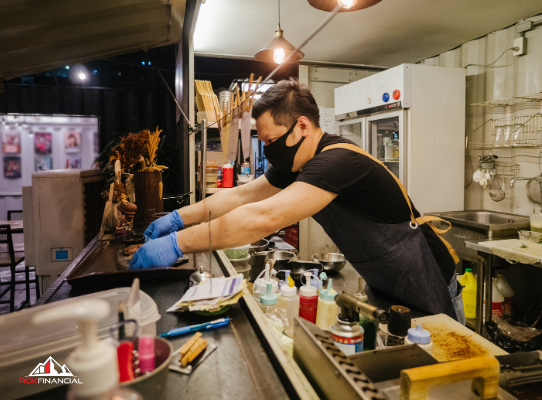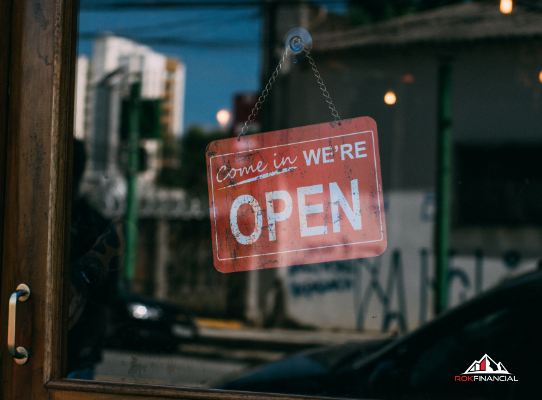If you’re thinking about taking out a loan for your new retail shop, you might be feeling intimidated: how do you go about securing financing for your small business?
Discover how to get a loan for a retail shop, what types of loans are available to you, and how to prepare to qualify in our simple three-step guide.
Step 1: Know Your Options
Trying to decide which option is best for your retail business can be overwhelming, to ease that stress we have laid out what options can benefit your business.
SBA Loans
SBA Loans are one of the post popular options when it comes to financing for small business owners. This is because these small business loans are backed by the Small Business Administration (SBA) and have favorable terms.
Although banks are still lending out money to small businesses, the SBA guarantees to pay back a portion of your borrowed funds if things don’t go as planned. This gives start up businesses an opportunity to receive funding from banks with stringent qualification requirements.
The following are the two SBA loan options you should be aware of:
SBA 7(a) Loans
There are almost no limitations on what you can invest money from an SBA 7(a) loan into, as the maximum amount you can get is $5 million. The SBA guarantees to repay 85% of loans under $150,000 and 75% of loans over $150,000, if your business were to close.
SBA 504/CDC Loans
This is the best loan for purchasing retail shopping space. This SBA Program aims to help business owners invest in fixed assets, such as property, furniture, and land. The SBA works alongside a Certified Development Company (CDC), an organization that encourages local economic development by granting 504 loans.
As with SBA 7(a) loans, you can request up to $5 million. Benefits include up to 90 percent financing, fixed interest rates, and no balloon payments.
Business Line of Credit
Small business owners are typically planning for cash flow fluctuations before they even happen. Preparing for these situations and having a plan set is key to keeping business operating as usual. If you are planning to use your funding to cover overhead expenses when these cash flow fluctuations happen, the best option for you may be a Business Line of Credit.
This type of loan has different terms compared to a standard small business loan. A set amount of funds is agreed upon but you are able to access your funds and use them as needed, rather than one lump sum upfront. As you use these funds, you pay back what was borrowed on a repayment plan.
Startup Funding
If you are interested in a start up business loan for your retail business but are unsure of the process or where to begin, this may be the best option for you. If you have been in business for less than six months, you may qualify for Startup Funding. Keep in mind, qualification is typically based largely on your personal credit history and evidence of a thorough business plan.
This will be your best option if you are getting a small business loan in retail without contracts.
Other Types of Small Business Loans
You can use a small business loan for retail to cover specific expenses or opt for a different loan type. These are alternative options for Small Business Loans:
Equipment Loans
This small business loan option is use specifically for purchases equipment for your retail store, such as cash registers, pricing guns, etc.
Inventory Financing
Like an Equipment Loan, this financing option allows you to purchase inventory for your store if you want to sell high-demand or high-value items but don’t have the cash flow to purchase them.
Personal Loans
It is possible to take out a personal loan to dedicate toward your retail shop, if you don’t need a large amount of funds. Although, if your credit score is low, you are most likely not going to qualify for a personal loan.
Step 2: Have a Plan
It is crucial to have a concrete business plan before beginning the process of applying for a small business loan. Here are some tips to keep in mind before taking that first step:
Clear Business Plan
Before you apply, make sure you have a clear, set plan for your retail business. How much will you need to spend on inventory? Who is your largest demographic? What are their spending habits? Making sure you have a clear idea of what you will need to spend your financing on is key to a successful business.
Factoring in all of the variables will allow you to estimate how much money you will need to get you retail shop off the ground and get business booming.
Know the Law
Brush up on your local laws for business owners, as well as general nationwide laws. For example, a business owner looking for a residential loan for investors would be aware of local ordinances when invested in mixed-use properties. This also includes understanding tax obligations and administrative fees to ensure your business is operating well and your loan will cover any upfront expenses.
Do Your Research
Make sure to research what similar proprietors had to invest into their business to get it up and running in your area.
Step 3: How to Qualify for a Small Business Loan
To qualify for a small business loan for a retail shop, meet specific eligibility requirements. These requirements may vary depending on the loan type and the lending institution. Most lenders will require a business plan, financial statements, references, and work history. They will also check your credit history, if your credit score is less than stellar there are still loan options for you.
Here’s what you can do to increase your chances of qualifying for a small business loan:
Practice Good Financial Habits
Lenders will examine your history and activities in terms of debt repayment. Paying your bills on time and avoiding excessive or long-term debt (credit cards), can contribute towards your ability to qualify. You can work to pay off your loan faster by setting a clear budget, starting a savings account, and cutting down on unnecessary personal expenditures.
Address Bad Credit Concerns
If you do happen to have a low credit score, you may want to wait to apply for a small business loan until you are able to build up your credit score a bit. Your credit score plays a major role in your qualification for a small business loan. Even a slight increase in your credit score could lessen your chances of approval. Your credit score will always be a factor when qualifying, especially if you are a start-up business.
Prepare a Robust Business Plan
This isn’t always required on loan applications, but it can help reassure lenders that you are prepared and have a strategy for how you plan to use your borrowed funds.
Apply for a Loan Today
Understanding the ins and outs of how to get a loan for a retail shop will make the application process much smoother. To get started, apply now with ROK Financial and get paired with a financial advisor to discuss your options.
Understanding how a small business loan works and what your options are can make the process of applying for a small business loan for your retail business go much smoother. To get started complete our 15-Second Application and talk to a ROK Financial business advisor today.













